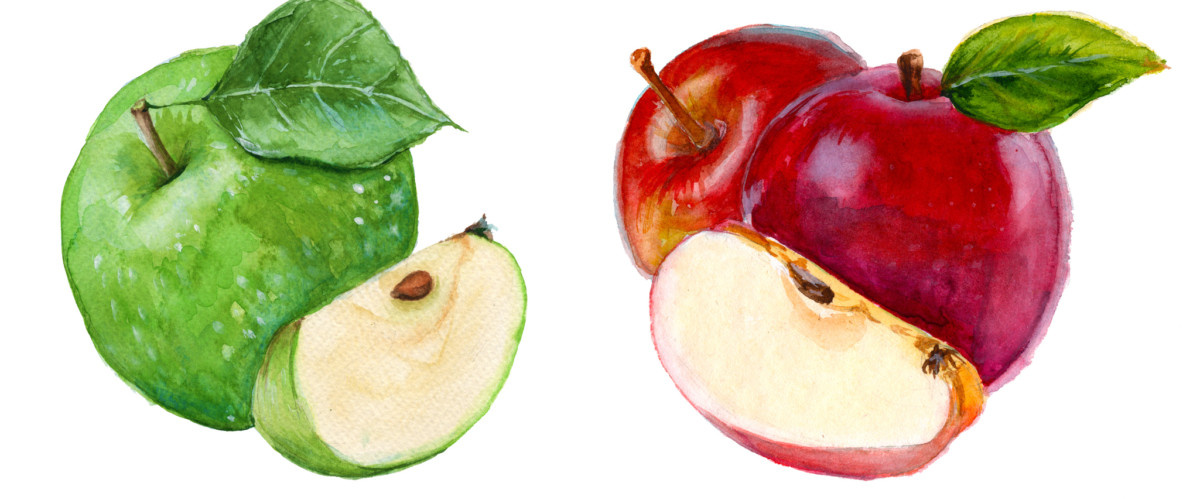Simply Perfect

I recently went to our local food co-op in search of some apples. Not only did I find myself confronted with about ten large baskets of different varieties, but also within each basket were various shades and sizes of that same variety. With so many choices what is a guy to do?
Without much conscious choice I found myself pawing through a couple of the baskets trying to narrow down my choices. Actually I didn’t even really know what I was looking for. I just instinctually felt I shouldn’t choose those on the top of the baskets. I began wondering what the “perfect” apple might look like? After all who wants imperfect apples when you can get a perfect one…right?
Of course, in order to select the perfect apples, I needed to develop a standard by which to grade this “fruit of Eden”. What is this thing called perfection anyway? And, how often do we judge apples and ourselves by some type of gold standard?
The Western View of Perfection
The Western mind usually approaches perfection as a ladder. The higher we climb up the ladder towards the top rung, the closer we get to perfection. The main problem with this approach is that I have yet to find anyone who has made it to the top. Granted, some appear much higher than others but, darn, we keep sliding back down the rungs at the most inopportune times.
This process becomes especially complicated when we base our identity and self-worth upon how high we get on the ladder. As a psychologist, I have worked with untold numbers of people who struggle with life-long guilt because they have neither made it to the top (what ever that means) nor are they lofty enough to be acceptable to the important others in their life. By the way, I have always experienced particular puzzlement for those with an ultra-conservative religious drive to reach the top. If they ever achieved perfection wouldn’t that make them…well…God?
Regarding the apple, perfection (for many people) is achieved when the apple is bright red, crisp, juicy, and without blemish. I suppose it would look something akin to the classic Washington Red Delicious.
The Asian View of Perfection
Philosophically, the Asian view of perfection is quite different from that of the West. Granted, many Asians have become quite westernized, not only with the eating of fast-food but also in their pragmatic view of perfection.
First, let’s say our friendly Asian philosopher likes our classic Washington Red Delicious apple. It is bright red, crisp, juicy, and without blemish. He too would say the apple is perfect. But here is the catch, he also would say the apple was perfect if it was a Honey Crisp apple, which is mottled in color. Oh dear, then he would say the same of a bright green, sour, not juicy Granny Smith. What is happening here?
Second, beyond allowing for varietal differences, our philosopher friend would also suggest that the apple (whichever variety) is perfect at EACH stage of development. Wait just a minute now! Yes, he would agree that the apple is perfect when it is ready to be picked.
The apple is also perfect when it ripens, becomes blemished, and drops to the ground. In so doing it bruises itself.
It is perfect when it begins to rot, since decompensation is meant to provide moisture and nutrients to the interior seeds for growth.
It is perfect in it’s development when that little sapling begins to grow.
It is perfect when the young tree sprouts buds, which eventually flower.
Those perfect flowers soon develop into hard green embryonic apples. After a few weeks the hard green nubbins grow and grow to an adult apple size…perfect.
Eventually the apple becomes whatever its DNA has designed it to become…perfect, worms and all. And on and on and on it goes. Perfect at each stage of development. Being just what it was meant to be.
Now what of us? What if we were to adopt the Asian view of perfection? Just imagine how much less guilt there would be in the world. That huge amount of perfectionistic guilt by-the-way, usually falls into the category of “garbage guilt”. The type of guilt, which has no “crime” attached to it, and no form of possible restitution. Just plain garbage.
When we practice the Asian model of perfection it is easier to experience gratitude for who we are and then continue to be the best of who we are…blemishes and all.
No matter what age of development we are in…we are after all as perfect as a rotten apple.
Tim Berry
